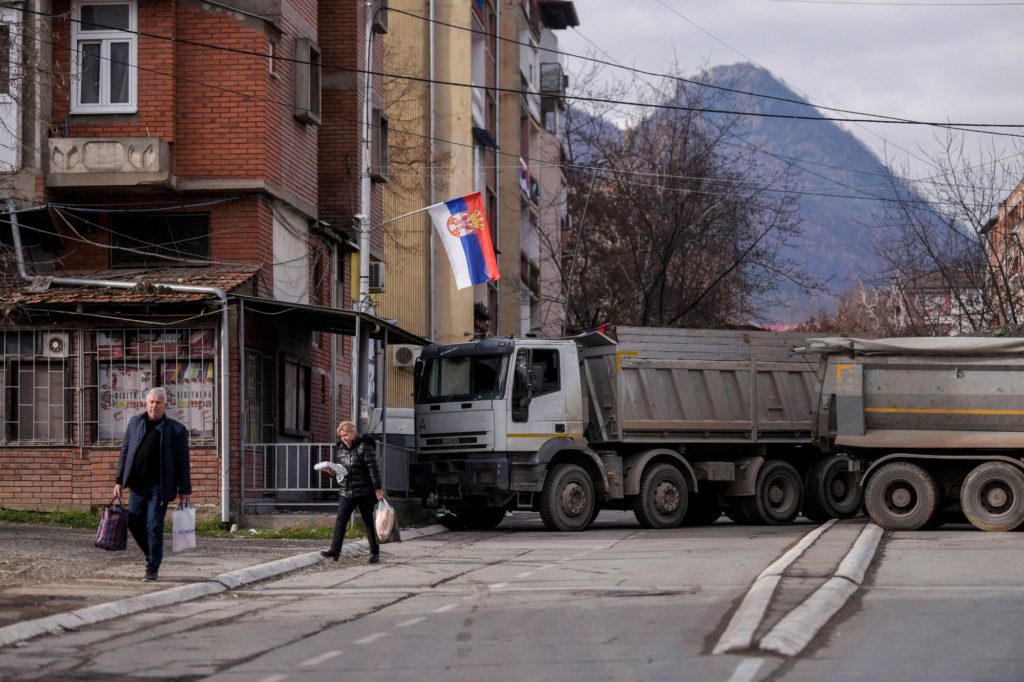Serbs in Kosovo began removing road barricades erected in protest against the largely ethnic-Albanian government, after the US and European Union increased pressure on both sides to avert a new Balkan conflict.
(Bloomberg) — Serbs in Kosovo began removing road barricades erected in protest against the largely ethnic-Albanian government, after the US and European Union increased pressure on both sides to avert a new Balkan conflict.
After weeks of obstruction, protesters on Thursday ceased blocking traffic at Merdare, the key border crossing between Serbia and Kosovo, police said. At the same time, two trucks used to block roads in northern Kosovo were set on fire, Kosovo police said on Twitter.
Serbian President Aleksandar Vucic canceled a state of highest alert for his country’s military, the Tanjug newswire reported, after announcing that Serbs blocking Kosovo’s borders had agreed to remove the obstacles. On Wednesday, the US and the European Union demanded an immediate end of the standoff. Germany also called on the Serbs in northern Kosovo to remove the “illegal” barricades.
Vucic read from a list of conditions set by protesters, with whom he held talks in the southern Serbian city of Raska late on Wednesday, that demanded the government in Pristina stop arresting Serbs and refrain from prosecuting protesters.
“If the terror continues, we will shut off the north of Kosovo forever for Pristina’s institutions, and we demand guarantees that Kosovo will never be recognized,” Vucic read from a list made by protesters in a television broadcast. He said it may take a few days to remove the barricades completely.
The government in Pristina condemns the protests and accuses Serbia of fomenting unrest to thwart Kosovo’s sovereignty after it declared independence in 2008. Prime Minister Albin Kurti had said authorities would arrest protesters if they did not relent.
One of the Kosovo Serbs, whose recent arrest on terrorism charges had galvanized the protests, was released from custody overnight into house arrest. Vucic hailed the transfer as a “small tactical win,” while Kurti and Kosovo President Vjosa Osmani demanded an explanation from the court.
With deep distrust and conflicting interests, the wartime foes remain far from resolving differences, a key condition for their ambition to eventually join the EU. Years of EU mediation between Serbia and Kosovo have made little progress.
“We call on everyone to exercise maximum restraint, to take immediate action to unconditionally de-escalate the situation, and to refrain from provocations, threats, or intimidation,” the EU and US said in a joint statement on Wednesday.
The standoff has flared since earlier this year, when Kurti’s government tried to enforce new rules requiring Serbs switch to car plates and personal documents issued by Pristina rather than Belgrade.
With many Serbs refusing to comply, Kosovo authorities stepped up police presence in the north. At the same time, Kurti has refused to grant autonomy to the Serb community, which Vucic’s says violates previous EU-brokered agreements.
Some 600 ethnic Serbs quit their public sector jobs in Kosovo in protest last month as tensions mounted. Their inclusion in Kosovo’s institutions under a EU-brokered agreement in 2013 unraveled as the confrontation escalated.
Vucic has accused Kosovo’s government of trying to drive out the roughly 100,000 ethnic Serbs remaining in Kosovo. He revoked a decision from earlier in the week to put the military on alert to respond if violence erupted between the Serb minority and ethnic-Albanian authorities, Tanjug said, citing an official from his office it didn’t name.
The Serbian leader promised to never recognize the sovereignty of Kosovo, which is still seeking international acknowledgment that it’s a country more than two decades after a NATO-led bombing campaign ended a war between the two sides by driving Serbian troops out.
“If they start arresting Serbs because of the barricades, you will have support from Serbia,” Vucic said. “You have my word.”
(Updates with Serbia cancelling heightend alert for military in third paragraph.)
More stories like this are available on bloomberg.com
©2022 Bloomberg L.P.










